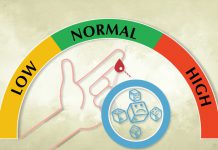Importance Of Insulin
It is impossible to overestimate the importance of insulin. Produced by the pancreas, this hormone is responsible for several important functions in the body. It is crucial to understand the importance of insulin to manage your blood glucose levels and prevent diabetes complications.
Role of Insulin
This is how insulin works in your body.
If you are a non-diabetic person,
- insulin Regulates blood glucose levels. After you eat food, carbohydrates are broken down into glucose (sugar). This is your body’s primary source of energy. When the sugar enters the bloodstream, it triggers the pancreas to produce insulin. This hormone allows glucose to enter the body’s cells to provide energy for performing various functions.
- Stores excess glucose for energy. After you eat food (insulin levels are high), there is excess glucose in the bloodstream (hyperglycemia). Insulin encourages the liver to retain excess glucose as glycogen. When the insulin levels are low (between meals), the liver releases glycogen into the bloodstream as glucose. As a result, insulin ensures that blood glucose levels remain normal at all times.
If you are a diabetic
People with type 1 diabetes produce very little or no insulin. And people with type 2 diabetes cannot produce enough insulin (insulin deficiency) or cannot use insulin efficiently (insulin resistance). As a result, after you eat, your glucose levels will continue to increase because there is no or not enough insulin to take the glucose to the body’s cells. The increased levels of blood glucose lead to complications such as nerve damage, heart problems, blindness, stomach problems, and kidney damage.
Importance of Insulin Therapy
Insulin therapy helps persons with type 1 and type 2 diabetes do what their pancreas can’t. For type 1 diabetes, insulin therapy is needed for them to live. Insulin therapy may be used to regulate blood sugar levels and prevent problems in persons with type 2 diabetes.
Insulin injections are of the following types:
Rapid-acting insulin
It enters the bloodstream within 15 minutes and is effective for up to 4 hours.
Short-acting insulin
It takes 30 minutes to enter the bloodstream and works for up to 6 hours.
Intermediate-acting insulin
It takes 2 to 4 hours for it to reach the bloodstream and is effective for up to 18 hours.
Long-acting insulin
It takes a few hours to reach the bloodstream but is effective for about 24 hours.
Insulin is a crucial part of your metabolism. Without insulin, your body would cease to function normally. If you have diabetes or are at a higher risk for diabetes (family history, obesity, and sedentary lifestyle), it’s important to eat healthy food, exercise regularly, and maintain your weight. An annual checkup is a must. Blood tests, including fasting insulin tests, help in the diagnosis of diabetes and ensure accurate treatment is administered for better management of the disease.










